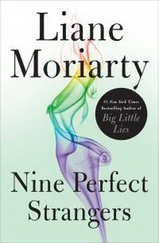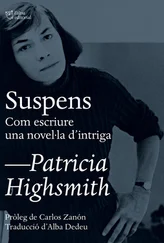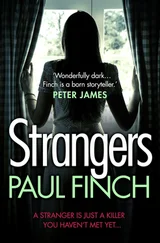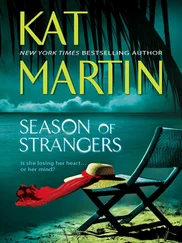“Miriam?” called the girl’s voice.
Bruno sprang up and stumbled straight away toward the center of the island, then turned left to bring him out near his boat. He found himself scrubbing something off his hands with his pocket handkerchief. Miriams spit. He threw the handkerchief down and swept it up again, because it was monogrammed. He was thinking! He felt great! It was done!
“Mi-ri-am!” with lazy impatience.
But what if he hadn’t finished her, if she were sitting up and talking now? The thought shot him forward and he almost toppled down the bank. A firm breeze met him at the water’s edge. He didn’t see his boat. He started to take any boat, changed his mind, then a couple of yards farther to the left found it, perched on the little log.
“Hey, she’s fainted!”
Bruno shoved off, quickly, but not hurrying.
“Help, somebody!” said the girl’s half gasp, half scream.
“Gawd!—Huh-help!”
The panic in the voice panicked Bruno. He rowed for several choppy strokes, then abruptly stopped and let the boat glide over the dark water. What was he getting scared about, for Christ’s sake? Not a sign of anyone chasing him.
“Hey!”
“F’God’s sake, she’s dead! Call somebody!”
A girl’s scream was a long arc in silence, and somehow the scream made it final. A beautiful scream, Bruno thought with a queer, serene admiration. He approached the dock easily, behind another boat. Slowly, as slowly as he had ever done anything, he paid the boatkeeper.
“On the island!” said another shocking, excited voice from a boat. “Girl’s dead, they said!”
“Dead?”
“Somebody call the cops!”
Feet ran on the wooden dock behind him.
Bruno idled toward the gates of the park. Thank God he was so tight or hung over or something he could move so slowly! But a fluttering, unfightable terror rose in him as he passed through the turnstile. Then it ebbed quickly. No one was even looking at him. To steady himself, he concentrated on wanting a drink. There was a place up the road with red lights that looked like a bar, and he went straight toward it.
“Cutty,” he said to the barman.
“Where you from, son?”
Bruno looked at him. The two men on the right were looking at him, too. “I want a Scotch.”
“Can’t get no hard liquor round here, man.”
“What is this, part of the park?” His voice cracked like the scream.
“Can’t get no hard liquor in the state ofTexas.”
“Gimme some of that!” Bruno pointed to the bottle of rye the men had on the counter.
“Here. Anybody wants a drink that bad.” One of the men poured some rye in a glass and pushed it over.
It was rough as Texas going down, but sweet when it got there. Bruno offered to pay him, but the man refused.
Police sirens sounded, coming closer.
A man came in the door.
“What happened? Accident?” somebody asked him.
“I didn’t see anything,” the man said unconcernedly.
My brother! Bruno thought, looking the man over, but it didn’t seem the thing to do to go over and talk to him.
He felt fine. The man kept insisting he have another drink, and Bruno had three fast. He noticed a streak on his hand as he lifted the glass, got out his handkerchief, and calmly wiped between his thumb and forefinger. It was a smear of Miriam’s orangey lipstick. He could hardly see it in the bar’s light. He thanked the man with the rye, and strolled out into the darkness, walking along the right side of the road, looking for a taxi. He had no desire to look back at the lighted park. He wasn’t even thinking about it, he told himself. A streetcar passed, and he ran for it. He enjoyed its bright interior, and read all the placards. A wriggly little boy sat across the aisle, and Bruno began chatting with him. The thought of calling Guy and seeing him kept crossing his mind, but of course Guy wasn’t here. He wanted some kind of celebration. He might call Guy’s mother again, for the hell of it, but on second thought, it didn’t seem wise. It was the one lousy note in the evening, the fact he couldn’t see Guy, or even talk or write to him for a long while. Guy would be in for some questioning, of course. But he was free! It was done, done, done! In a burst of well-being, he ruffled the little boy’s hair.
The little boy was taken aback for a moment, then in response to Bruno’s friendly grin, he smiled, too.
At the Atchison, Topeka and Santa Fe Railroad terminal, he got an upper berth on a sleeper leaving at 1:30 A.M., which gave him an hour and a half to kill. Everything was perfect and he felt terribly happy. In a drugstore near the station, he bought a pint of Scotch to refill his flask. He thought of going by Guy’s house to see what it looked like, debated it carefully, and decided he could. He was just heading for a man standing by the door, to ask directions—he knew he shouldn’t go there in a taxi—when he realized he wanted a woman. He wanted a woman more than ever before in his life, and that he did pleased him prodigiously. He hadn’t wanted one since he got to Santa Fe, though twice Wilson had gotten him into it. He veered away right in the man’s face, thinking one of the taxi drivers outside would be better to ask. He had the shakes, he wanted a woman so badly! A different kind of shakes from liquor shakes.
“Ah don’ know,” said the blank, freckle-faced driver leaning against his fender.
“What d’you mean, you don’t know?”
“Don’ know, that’s all.”
Bruno left him in disgust.
Another driver down the sidewalk was more obliging. He wrote Bruno an address and a couple of names on the back of a company card, though it was so close by, he didn’t even have to drive him there.
Thirteen
Guy leaned against the wall by his bed in the Montecarlo, watching Anne turn the pages of the family album he had brought from Metcalf. These had been wonderful days, his last two with Anne. Tomorrow he left for Metcalf. And then Florida. Mr. Brillhart’s telegram had come three days ago, saying the commission was still his. There was a stretch of six months’ work ahead, and in December the commencement of their own house. He had the money to build it now. And the money for the divorce.
“You know,” he said quietly, “if I didn’t have Palm Beach, if I had to go back to New York tomorrow and work, I could, and take anything.” But almost as he said it, he realized that Palm Beach had given him his courage, his momentum, his will, or whatever he chose to call it, that without Palm Beach these days with Anne would give him only a sense of guilt.
“But you don’t have to,” Anne said finally. She bent lower over the album.
He smiled. He knew she had hardly been listening to him. And, in fact, what he had said didn’t matter, as Anne knew. He leaned over the album with her, identifying the people that she asked about, watching amusedly as she examined the double page of his pictures that his mother had collected, from babyhood to about twenty. He was smiling in every one of them, a shock of black hair setting off a sturdier, more careless-looking face than he had now.
“Do I look happy enough there?” he asked.
She winked at him. “And very handsome. Any of Miriam?” She let the remaining pages slip past her thumbnail.
“No,” Guy said.
“I’m awfully glad you brought this.”
“My mother would have my neck if she knew it was in Mexico.” He put the album back in his suitcase so he wouldn’t possibly leave it behind. “It’s the most humane way of meeting families.”
“Guy, did I put you through much?”
He smiled at her plaintive tone. “No! I never minded a bit!” He sat down on the bed and pulled her back with him. He had met all of Anne’s relatives, by twos and threes, by dozens at the Faulkners’ Sunday suppers and parties. It was a family joke how many Faulkners and Weddells and Morrisons there were, all living in New York State or in Long Island. Somehow he liked the fact she had so many relatives. The Christmas he had spent at the Faulkners’ house last year had been the happiest of his life. He kissed both her cheeks, then her mouth. When he put his head down, he saw Anne’s drawings on the Montecarlo stationery on the counterpane, and idly began to push them into a neat stack. They were ideas for designs that had come to her after their visit to the Museo Nacionale this afternoon. Their lines were black and definite, like his own rough sketches. “I’m thinking about the house, Anne.”
Читать дальше












